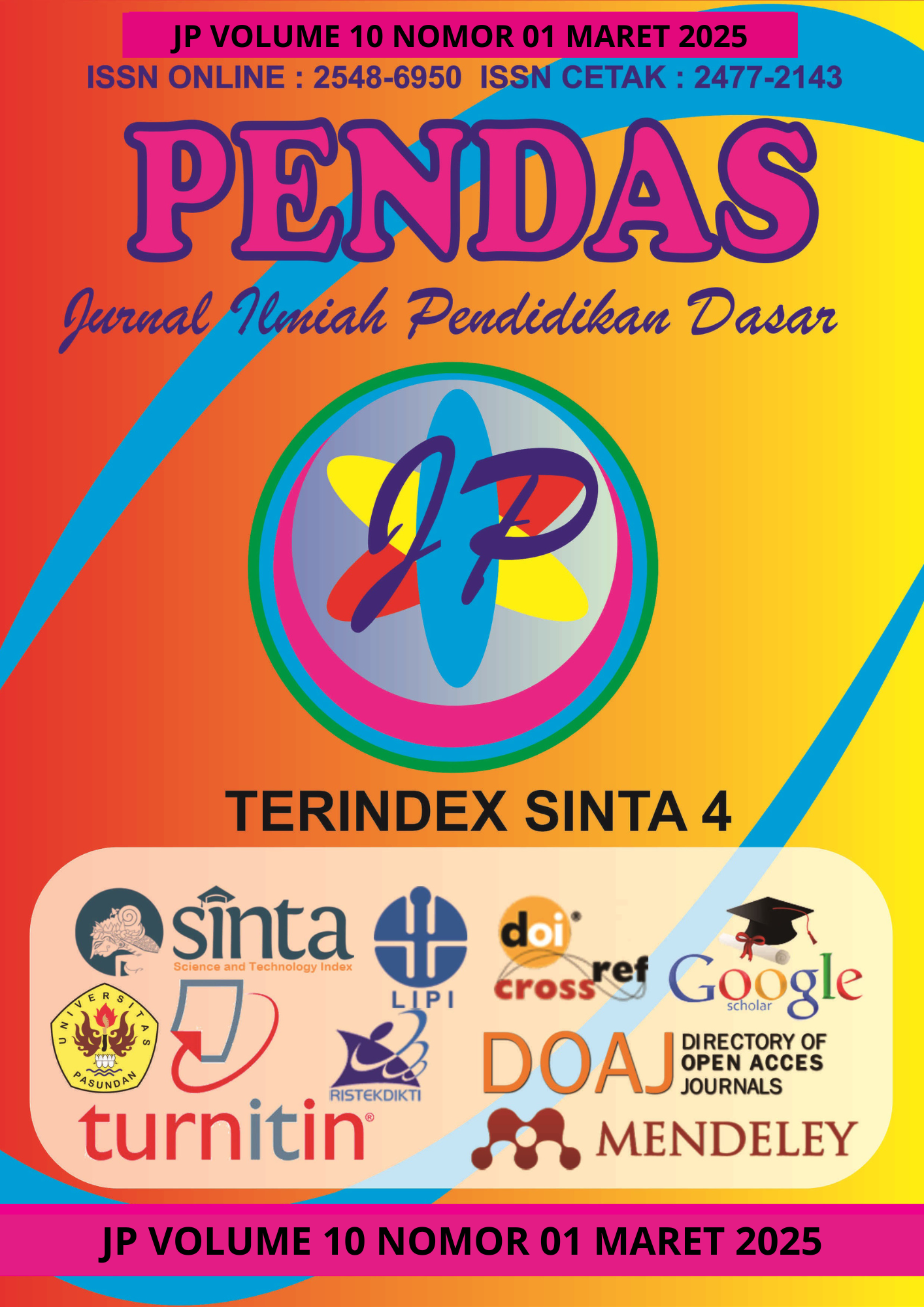EFEKTIVITAS PENERAPAN MODEL INDUKTIF KATA BERGAMBAR DAN INVESTIGASI KELOMPOK TERHADAP HASIL BELAJAR KITABAH SISWA SEKOLAH DASAR
DOI:
https://doi.org/10.23969/jp.v10i01.23507Keywords:
Inductive Pictured Words Model, Group Investigation, Kitabah Learning Outcomes, Scientific Attitudes, Elementary EducationAbstract
This study was motivated by the low learning outcomes in Kitabah and the teacher-centered learning approach, which made students passive in the learning process. The research aims to examine the effectiveness of the Inductive Pictured Words Model and the Group Investigation Model on Kitabah learning outcomes among elementary school students. This study employs a quantitative approach with an experimental method, specifically using a quasi-experimental design with a pretest-posttest control group design. The sample was selected through cluster random sampling and consisted of sixth-grade students at SD Al Azhar Bandar Lampung, with 28 students in the experimental class and 25 students in the control class. The research findings indicate that the Inductive Pictured Words Model and the Group Investigation Model significantly improve students' Kitabah learning outcomes. The t-test results show that t-value (3.506) exceeds t-table (2.005), leading to the acceptance of H₁, which confirms that these models positively impact students' learning achievements. Posttest data reveal that the experimental class obtained an average learning outcome score of 81.20, while the control class scored 72.1. Additionally, these models foster scientific attitudes, with the highest score recorded in objectivity/honesty (83.57%) and the lowest in collaboration (68.57%). Overall, the findings suggest that the Inductive Pictured Words Model and the Group Investigation Model are effective learning strategies that enhance Kitabah learning outcomes and scientific attitudes, making them suitable for use in elementary school education.
Downloads
References
Agustin, R. D., & Mindaudah, M. (2022). Pengaruh Media Film Animasi terhadap Keterampilan Berbicara pada Anak Usia Dini. Journal of Education Research, 3(2), 70–80. https://doi.org/10.37985/jer.v3i2.80
Bonne, L., & Higgins, J. (2022). Game playing and fluctuations in emotional climate. Cultural Studies of Science Education, 17(4), 1063–1079. https://doi.org/10.1007/s11422-022-10125-4
Calhoun, E. (1999). Teaching beginning reading and writing with the picture word inductive model. ASCD.
Creswell, J. W. (2014). Research Design: Qualitative, Quantitative, and Mixed Methods Approaches. Thousand Oaks, California. USA: SAGE Publications, Inc.
Duschl, R. (2008). Science Education in Three-Part Harmony: Balancing Conceptual, Epistemic, and Social Learning Goals. Review of Research in Education, 32(1), 268–291. https://doi.org/10.3102/0091732X07309371
Kounsar, A. (2016). Journal of Islamic Thought and Civilization (JITC) The Concept of Tawhid in Islam: In the light of Perspectives of Prominent Muslim Scholars THE CONCEPT OF TAWHID IN ISLAM: IN THE LIGHT OF PERSPECTIVES OF PROMINENT MUSLIM SCHOLARS. 6(Ii). Retrieved from https://doi.org/10.32350/jitc
Kusnadi, E. (2005). Metodologi Penelitian. Metro: Ramayana Pers.
Manan, A., & Nasri, U. (2024). Tantangan dan Peluang Pendidikan Bahasa Arab: Perspektif Global. Jurnal Ilmiah Profesi Pendidikan, 9(1), 256–265. https://doi.org/10.29303/jipp.v9i1.2042
Masitoh. (2008). Strategi Pembelajaran Tingkat Universitas Terbuka. Jakarta: University Press Universitas Terbuka.
Masrukhin. (2009). Metodologi Penelitian Kuantitatif. Kudus: STAIN Kudus.
Melmambessy, M. (2012). Analisis Pengaruh Pendidikan, Pelatihan, dan Pengalaman Kerja terhadap Produktivitas Kerja Pegawai Dinas Pertambangan dan Energi Provinsi Papua. Media Riset Bisnis & Manajemen, 12(1).
Muhammad Khuliy-Al, A. (2016). Model Pembelajaran Bahasa Arab. Bandung: Royyan Press.
Munawarah, M., & Zulkiflih, Z. (2021). Pembelajaran Keterampilan Menulis (Maharah al-Kitabah) dalam Bahasa Arab. Loghat Arabi : Jurnal Bahasa Arab Dan Pendidikan Bahasa Arab, 1(2), 22. https://doi.org/10.36915/la.v1i2.15
Osman, N., Mohd Noor, S. S., Che Hat, N., Mohmad Rouyan, N., & Mat Saad, K. N. (2023). Students’ acceptance of flipped learning through Google application. Online Journal of Communication and Media Technologies, 13(4), e202360. https://doi.org/10.30935/ojcmt/13786
Prasetyo, Z. K., & Widodo, W. (2022). Enhancing students’ scientific attitudes through project-based learning in biology. Journal of Physics: Conference Series, 1823(1), 12015.
Putri, R. I. I., & Zulkardi. (2019). Project-based learning to promote scientific attitude and self-efficacy in learning physics. Journal of Physics: Conference Series, 1157(2), 22099.
Rahmawati, Y., & Ridwan, A. (2020). Developing students’ scientific attitudes through project-based learning in chemistry. Journal of Physics: Conference Series, 1521(2), 22020.
Romiszowski, A. J. (2024). Producing instructional systems: Lesson planning for individualized and group learning activities. Taylor & Francis.
Sari, N., Muslim, A. B., Sodiq, A., Erlina, E., & Sufian, M. (2024). Influence of Teams Games Method by Kokami and Learning Motivation on Arabic Language Learning Outcomes / Pengaruh Teams Games Method by Kokami dan Motivasi Belajar terhadap Hasil Belajar Bahasa Arab. Loghat Arabi : Jurnal Bahasa Arab Dan Pendidikan Bahasa Arab, 5(1), 75. https://doi.org/10.36915/la.v5i1.180
Shoimin, A. (2014). Model Pembelajaran Inovatif dalam Kurikulum 2013. Yogyakarta: Ar-Ruzz Media.
Sobur, K. (2013). Tauhid Teologis. Jakarta: Gaung Persada Press Group.
Strom, K. J., Mills, T., & Abrams, L. (2023). Non-Linear Perspectives on Teacher Development. London: Routledge. https://doi.org/10.4324/9781003372097
Sugiyono. (2017). Metode Penelitian: Kuantitatif, Kualitatif, dan R&D. Bandung: Alfabeta.
Sukmadinata, N. S. (2005). Metode Penelitian Pendidikan. Bandung: PT Remaja Rosdakarya.
Susanto, A. (2013). Teori Belajar dan Mengajar di Sekolah. Jakarta: Prenada Media Group.
Thohir, M. (2017). The influence of project-based learning on students’ scientific attitudes. Jurnal Pendidikan IPA Indonesia, 6(2), 365–369.
Triwiyanto, T. (2014). Pengantar Pendidikan. Jakarta: PT Bumi Aksara.
Wahba, K., Taha, Z. A., & England, L. (2014). Handbook for Arabic language teaching professionals in the 21st century. Routledge.
Zogla, I. (2018). Science of pedagogy: Theory of educational discipline and practice. Journal of Teacher Education for Sustainability, 20(2), 31–43. https://doi.org/10.2478/jtes-2018-0013
Downloads
Published
Issue
Section
License
Copyright (c) 2025 Pendas : Jurnal Ilmiah Pendidikan Dasar

This work is licensed under a Creative Commons Attribution 4.0 International License.














































